Our first week of special education preschool has been a total hit! The Twins are about to turn 3yrs old and it’s been 18months since we started our speech therapy journey. We’ve learned a lot along the way about the services available to those that need them and today I’m sharing a little about the process. From the tick box form at the pediatrician check-up to starting school this week, we’ve come a long way!
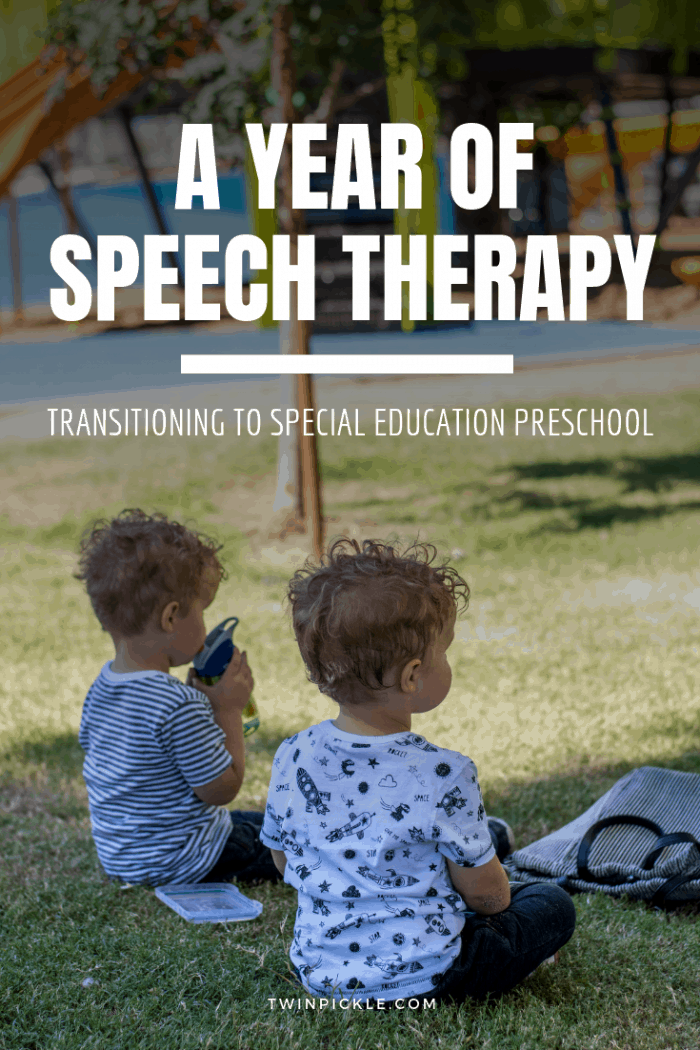
A Recap on How it All Started
You may or may not have been following along, so I’ll start with a little recap on how it all started. I always knew the Twins’ speech wasn’t as advanced as their sister’s was, but I became concerned at around 1yr old. They seemed to be making fewer sounds than they did a few months previously. What I thought was the beginnings of ‘mama’ and ‘dada’ had stopped and the only sound I got now was ‘da’.
They seemed to babble to each other and be happy so I put it down to a twin thing and tried not to worry. At their 15month development check the pediatrician showed a little concern for their lack of speech progress. They had however caught up really well on their slight delay in physical milestones, so he thought he’d give it another 3months to see if their speech caught up too. It didn’t. In fact, the gap between ‘normal’ and my boys just seemed to be getting bigger.
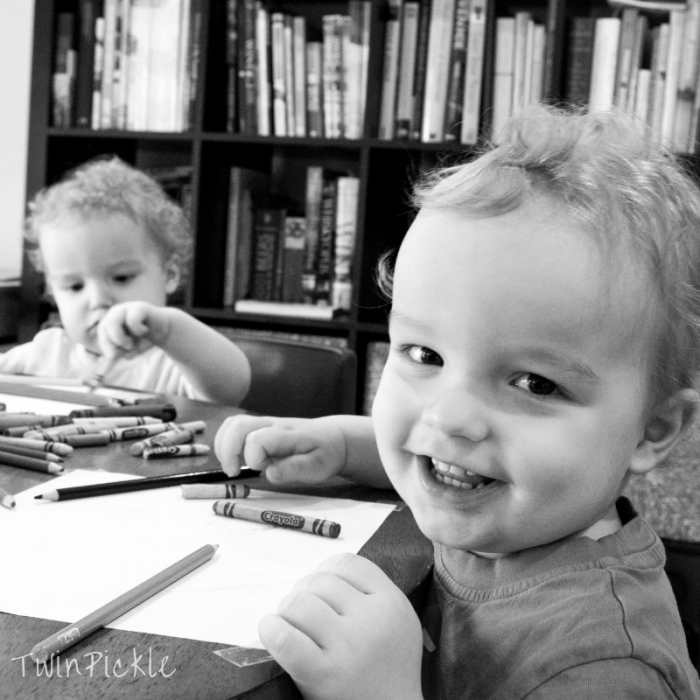
We were referred for evaluation to qualify for speech therapy through the Early Intervention Program. This process took about 3 months to complete and involved a number of meetings at our home. The Boys were tested for motor and speech skills and qualified based on their inability to communicate. I wrote a detailed post about the whole process here -> Qualifying for the Early Intervention Program.
A year of Speech Therapy
Since qualifying, the Early Intervention Program has allowed us a speech therapy home visit once a week. The Twins absolutely love their therapists and the activities. Not only have the exercises helped them focus on their words, but being able to talk to the therapist weekly has helped me as a Mom in encouraging their development.
A typical session would usually involve asking the boys to respond to flashcards with words, and rewarding them with an activity: Getting the next puzzle piece or getting to match a picture to a toy. The games themselves would also create an opportunity for practicing words. “What color piece would you like?” “What’s did you find inside the toy egg?”. Plenty of praise for them when they even try to pronounce a word and when appropriate they were corrected by modeling the sound for them to repeat.
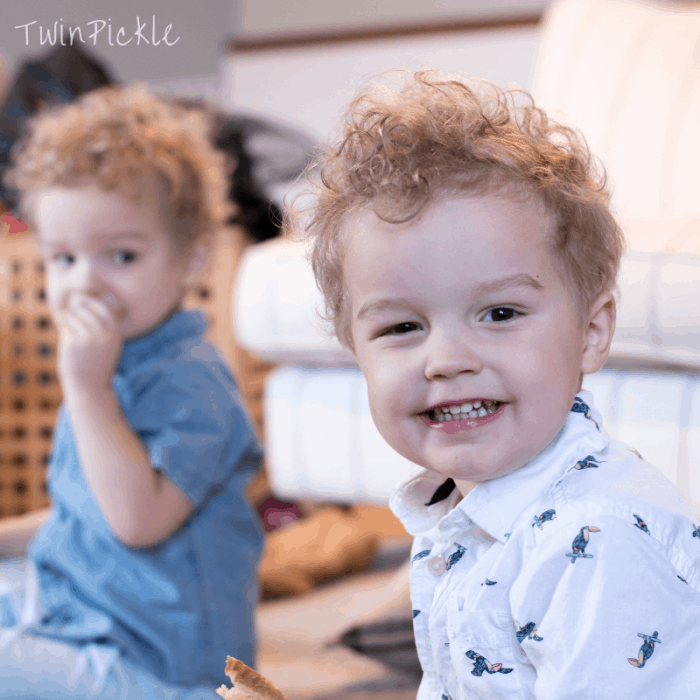
A few months into therapy and the boys were making progress, but they weren’t really closing the gap between their speech level and other kids their age. We had some words though… actual words, which was more than we had when we started. I passed on a few tips and shared a video of their progress here -> How to Empower and Challenge Toddlers to Talk.
It is difficult to know what of their progress is down to speech therapy and what would have happened on its own. But I do know that they have loved every minute of the sessions, and it has certainly helped me to feel active in their progression. I am frequently confronted with “Oh, they’ll catch up, they all do.” from family, friends and total strangers. Despite good intentions, it is extremely irritating when your child has been diagnosed with a disability and others brush it off as nothing… don’t do it, people!
Our Childhood Apraxia of Speech Diagnosis
Childhood Apraxia of Speech (CAS) is not normally diagnosed until at least 3yrs old. It was brought to my attention by our therapist about 6months into treatment. She saw signs of CAS… their inability to mimic sounds, however much they were broken down. The way they would pause and think before making a sound as if it was really hard work. The huge gap between their understanding and their ability to reciprocate language. She directed me to the Apraxia-Kids website which does a great job at explaining what CAS is and how you can get help.
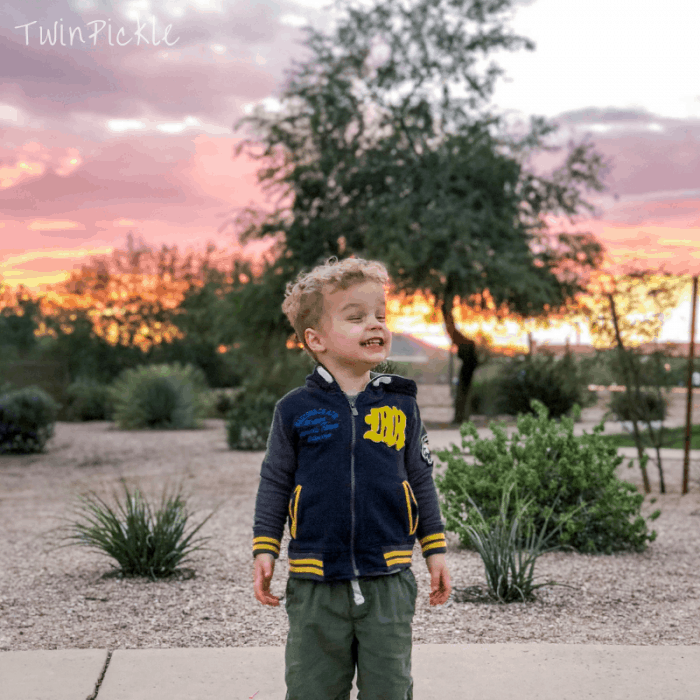
Before we started the transition paperwork for special education preschool our therapist was so confident in the diagnosis she recorded it in their file, despite them being young. When we went for the preschool evaluation, the speech pathologist also said they likely have Childhood Apraxia of Speech and she hadn’t seen the diagnosis from our therapist. So, it looks like we’ll be in therapy for a while yet, because CAS is something the Boys will deal with indefinitely.
Qualifying for Special Education Preschool
Because we were already in the Arizona Early Intervention Program (AZEIP), the process of applying for special education preschool was really easy. The school district was notified by AZEIP and an initial meeting was set up. This is what happened next:
- A meeting with our AZEIP therapists and the school to discuss the process and introduce the program.
- A screening appointment at the school to test hearing, eyesight, motor skills, social and speech skills. All was normal except speech and language (I was notified while I was at the screening).
- An evaluation appointment at the school for a more detailed testing of their speech, language and cognitive skills. A detailed report was sent in the mail but I was notified immediately that they had both qualified for special education preschool on the basis of speech.
- A meeting with the Boys’ teachers and in-house speech therapists to create their Individualized Education Program (IEP). This is a document which sets personalized progression goals for the following year.
- The Boys started school the following week.
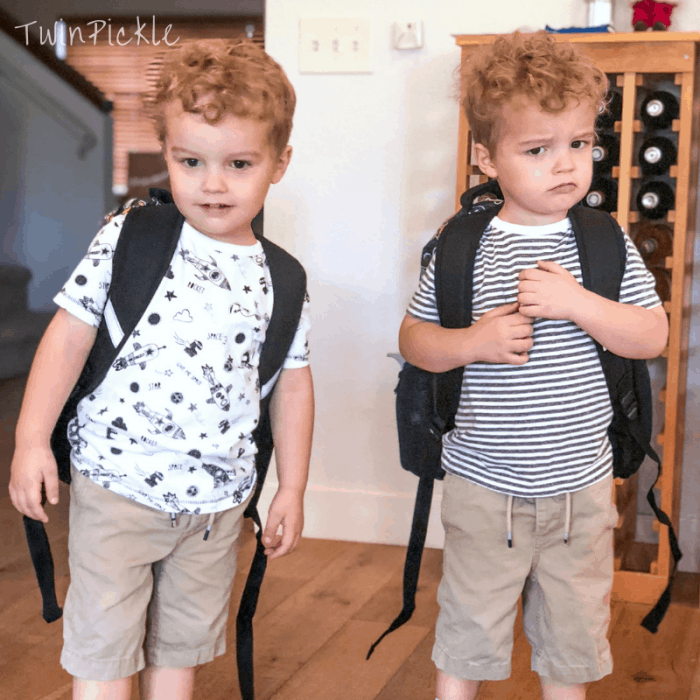
This process took about 3months, similar to qualifying for AZEIP a year ago. And similarly to the AZEIP evaluation process, the Boys only just qualified. This is because an average score is used across what they understand and what they can say. They both have an excellent understanding of language but scored in the 5th percentile for speaking. Overall they scraped through but I can see the potential for a frustrating result for some CAS cases because of this requirement for an average between two different skills.
What Is Special Education Preschool?
The Twins now go to special education preschool for a half day four times a week. The class is made up of mixed disabilities and some ‘Peer Models’. These are kids with strong speech and social skills who are there to help model for the kids with disabilities. Mixing everyone up means that what my boys lack in speech ability they make up for in social skills. They can feel confident in the skills they have and model for others that struggle in that department.
For example, they are great at role play, like serving each other at the play kitchen. A child with Autism may struggle with the concept of role-play activities and my boys can show them how it’s done. They learn from each other, embrace others’ strengths, and accept others’ quirks, which is a concept I love.
The day to day activities are very similar to regular preschool, with an emphasis on speech development and play. They will also receive two focused sessions with a speech pathologist per week at school, to work on their issues with grouping words and pronunciation. They will continue in the program until they reach Kindergarten where their IEP will be re-evaluated for mainstream school.
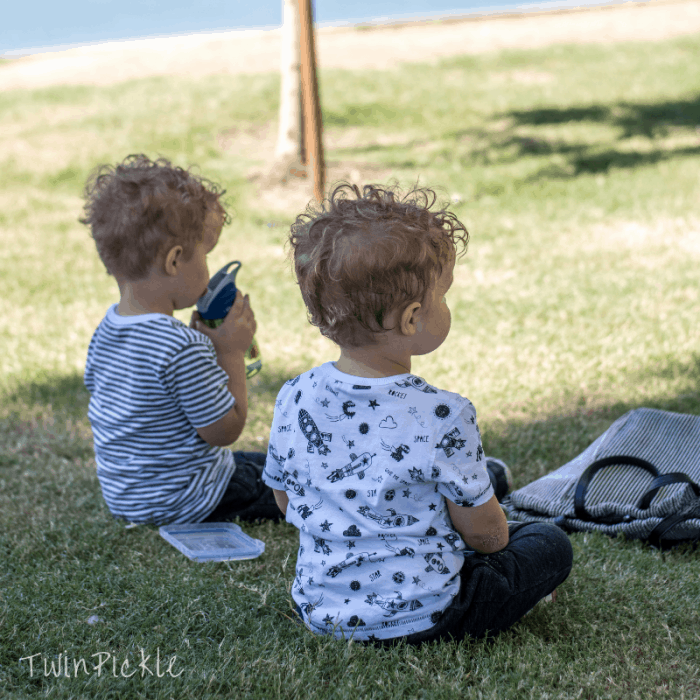
Final Thoughts on the ‘Special Needs’ label
I did not grow up with special educational needs. I generally excelled at school and always frowned upon the idea of labeling children as special needs. Friends at school were given ‘excuses’ to fail and I didn’t want my children being brought down by the system because at some point they struggled a little. I believed the ‘special needs’ badge battered self-esteem and told the wearer they were below their peers. How does that set them up for the future?
I then became a teacher. What we often don’t appreciate is the scale of the school system and how easy it is to get lost. Our beloved child is just one of the hundreds of children in a school desperately trying to fit into a standardized education program. IEPs helped me as a teacher quickly understand what my students needed to succeed. Without it, I would have spent half the year figuring out what makes them tick and the other half finding solutions. By the time the year is over another teacher is doing the same.
I am so glad I chose to pursue evaluation instead of waiting it out. Had I not been proactive as a parent in seeking help, my Boys would have been starting Kindergarten with Childhood Apraxia of Speech and no way of processing why they didn’t speak like the other kids in their class. If you know something is wrong, get help because there is plenty of it out there!

